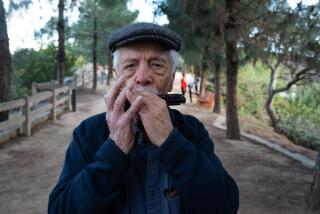Nearing 80, Old-Time Explorer Dwells in Two Worlds, Africa and Britain : Travel: Wilfred Thesiger has written two classic books on the Arab world and an autobiography, ‘The Life of My Choice.’
- Share via
LONDON — Tucked almost out of sight under Wilfred Thesiger’s jacket was a belt of colored beads made for him by Lawi, his Kenyan foster son.
The belt, an impish contrast to his understated brown morning attire, reflects the two worlds inhabited by Wilfred Thesiger, explorer, naturalist, traveler in the Empty Quarter of Arabia, dweller among the mysterious Marsh Arabs of Iraq and--on his annual visit to London--thoroughly English gentleman.
Thesiger, who will be 80 on June 3, is often called the last of the old-time explorers, having led a life redolent of Rudyard Kipling and Lawrence of Arabia.
He has written two classic books of travel and exploration, “The Marsh Arabs” and “Arabian Sands,” and an enthralling autobiography, “The Life of My Choice.”
Having walked about 40,000 miles in jungle, desert and mountain range, he has chosen to put up his feet in Maralal, a remote Kenyan town were he spends most of the year.
In London, Thesiger lives in his late mother’s book-lined Chelsea apartment and spends much of his time at the Travelers Club, a hide-out on Pall Mall for diplomats, travel writers and others of a peripatetic bent.
He is a tall, slightly stooped man with pale blue eyes, a strikingly long nose and a leathery face that looks freeze-dried by blazing days and icy nights in the desert.
“I think I was always a fit person,” he said in an interview. “All this stuff about boiling water or putting sterilizing tablets in the water--I’ve never boiled or sterilized water anywhere in my life and I’ve drunk it out of every ditch and drain that I’ve been to.”
That is part of the Thesiger ethic of exploration. Wherever he has traveled--in Africa, Arabia or the Hindu Kush--his goal has been to meet the people “on level terms.”
“I wanted no concessions,” he said. “All I wanted then was to live and be as near to them as I could possibly be. I’ve no desire to be an Englishman when I’m traveling about.”
Harold St. John Philby, another great explorer of Arabia, “told me that he always took a radio, wireless, whatever you call it, along with him so that he could listen to the (cricket) test matches,” Thesiger said. “Well, this to me would wreck the whole thing.”
Coupled with that outlook is an abiding dislike for change--all change. Cars and airplanes have “diminished the world and robbed it of all diversity,” he said, and pop music, which now reaches the darkest corners that he has explored, “exasperates me.”
Man’s landing on the moon, Thesiger has written, filled him “with a sense of desecration, and of despair at the deadly technical ingenuity of modern man.”
His love of the wild began in Ethiopia, where his father was a diplomat. At age 6 he watched the homecoming of the Ethiopian tribes from battle and was reminded of Homer’s Iliad.
He wrote that it “implanted in me a lifelong craving for barbaric splendor, for savagery, color and the throb of drums, and . . . a lasting veneration for long-established custom and ritual.”
Sent home to Eton, he became a solitary boy, knowing nothing about cricket or the English way of life, pining for Ethiopia. He went back after Oxford University, and at 23 discovered the source of the Awash River, roaming among the Danakil people, who measured their bravery by the number of men they killed and castrated.
Thesiger crossed the dunes of Arabia’s Empty Quarter on foot and camel both ways, subsisting on a pint of water a day. He ran secret desert missions in World War II, then spent seven years on and off with the Marsh Arabs, living among the reeds of the Shatt-al-Arab delta, emerging every six weeks or so for a hot bath.
As a boy, he accompanied his father to Aden and stood in a trench watching Turkish shells bursting. In Africa, he was wakened one night by what he thought was snoring, shook the supposed offender lying beside him and found it to be a lion.
He leads a simple life in Maralal, about 150 miles northwest of Nairobi, with Lawi, Kiberiti and Laputa, local men who attached themselves to him as boys, grew up as his foster sons, and now have families of their own.
When in England, he said, “I conform to all the rules. You’ve found me dressed like this because I haven’t been out, but normally I should be in a dark suit and going off to my club.”
Thesiger sees himself as the explorer who shut the door behind him, in the sense that the places he traveled have been tainted since by the cassette tape and the charter airline. Travel on foot or camelback, when you can do it by jeep, “becomes a stunt,” he said.
“I meet a lot of young people who come along to me and say, ‘Look here, we’d love to lead your life.’ And I’m afraid the only thing one can say is that it isn’t there.”
Thesiger laughs a lot, especially at himself when he stumbles over long sentences: “I’m getting all muddled up. This is old age.”
He tells funny stories, about grunting at the lions in Hyderabad Zoo so they grunted back, or teasing the late Joy Adamson of “Born Free” fame by saying all animals belong in zoos.
“She rose to her feet and her hands went like that”--he made a clawing gesture and imitated her Austrian accent--”and she said, ‘How dare you say a sing like zzat to me!’ . . . She had no sense of humor.”
Talking about the marshes, Thesiger lapses into fond reminiscence:
“In the evening, we’d be sitting in one of these reed houses and Falih would pick up a drum and start tapping like this, and others would get in their canoes and come over; the room would be absolutely packed, the walls would bulge outwards with people in there. And then, two or three little 14-year-olds would start dancing in the middle of the room and everybody would be singing.”
In his study are family photos, a string of Syrian worry beads, swords from Abu Dhabi and Oman, and a Kenyan snuffbox.
On the floor stands his mother’s ancient radio, which he tried, none too successfully, to tune to the BBC.
He isn’t isolated, he insisted; he does know about “strange things” happening in Eastern Europe, and that “Gorbachev got hooted at the other day” by angry crowds in Red Square.
Thesiger never married, and intends to be buried without ceremony in the garden at Maralal.
Recently, he went to the British Embassy in Nairobi to put that desire on record, lest people say, “ ‘Lawi didn’t even take the trouble to get him properly buried, just shoved him in a hole in the garden.’ Which is what I want him to do.”
More to Read
Sign up for The Wild
We’ll help you find the best places to hike, bike and run, as well as the perfect silent spots for meditation and yoga.
You may occasionally receive promotional content from the Los Angeles Times.






